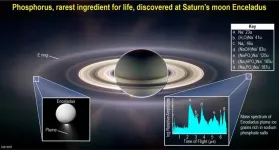(Press-News.org) WOODS HOLE, Mass. – Nearly a third of Earth’s freshwater resources lie in groundwater – much more than in all lakes, rivers and the atmosphere combined, and exceeded only by the frozen water in polar ice caps. Accordingly, about half of humankind depends on groundwater as a source of drinking water.
Despite the global occurrence and essential importance of groundwater, however, knowledge of the organisms that inhabit it, and how they survive, remains thin.
A recent investigation led by microbial ecologist Emil Ruff of the Marine Biological Laboratory (MBL) has discovered that ancient groundwaters harbor not only diverse and active microbial communities, but also unexpectedly large numbers of microbial cells. Strikingly, some of these microbes seem to produce “dark oxygen” (in the absence of sunlight) in such abundance that the oxygen may nourish not only those microbes, but also may leak into the environment and support other oxygen-reliant microbes that can’t produce it themselves. The study is published today in Nature Communications.
“When doing research, it is common to find surprising results; we just still know very little about the cosmos,” said Ruff. “But it is a highlight to find something so utterly unexpected as oxygen that seems to be produced deep beneath our feet in permanent darkness. At first we thought that we had contaminated all our samples, but additional analyses supported a source of the gas within the aquifers.”
The study investigated 138 groundwater samples drawn from 14 aquifers that lie beneath more than 80,000 square miles of prairie in the province of Alberta, Canada, an area three times the size of Ireland. The aim was to investigate the biogeochemistry and microbial ecology of a broad range of aquifer environments.
“The leakage of dark oxygen into the groundwaters could have very important consequences relevant for climate change research,” said co-author Marc Strous of the University of Calgary. ”We have indications that the microbes use the groundwater oxygen to consume methane, a greenhouse gas. Especially in the province of Alberta, methane is common in groundwaters and may leak out of the ground into the atmosphere. We will now seek to understand if and how much methane these microbes prevent from being emitted.”
Surprisingly, the team found significantly more microbial cells in older groundwater samples than in younger groundwaters, suggesting these ancient groundwaters have evolved over time to provide energy for microbes to grow. This discovery runs counter to prior studies in subsurface ocean and land ecosystems that found microbial cell density commonly decreases as depth increases, presumably due to energy limitations.
“Counting bacterial cells under a microscope requires enormous patience and skill and is rarely done for large numbers of samples,” said Strous. “Yet, when Isabella Hrabe de Angelis joined Dr. Ruff as a project student she did just that, and spent hundreds of hours behind a microscope. It was thanks to this effort that we could show that these groundwaters are actually productive ecosystems, where everybody had expected them to be subsurface ‘deserts,’ generally devoid of nutrients and energy.”
The study included collaborators from University of Calgary, Canada; Max Planck Institute for Chemistry, Mainz, Germany; Woods Hole Oceanographic Institution, and Alberta Environment and Protected Areas, Calgary, Canada.
Oxygen or die
Oxygen is vital to life for humans, most animals, and many microorganisms. By far, most oxygen on Earth is produced via photosynthesis, in which plants and microbes use sunlight as an energy source to assimilate carbon dioxide for growth. Because this oxygen isn’t all used up by the plants and microbes themselves, over eons it could accumulate in the atmosphere, where it is available to humans and other oxygen-dependent organisms.
There are, however, a few obscure chemical and microbial processes that can produce oxygen in the absence of light. In one case, microbes split nitric oxide into nitrogen and oxygen, and in the other they split chlorite into chloride and oxygen. These processes, also called microbial dismutations, were thought to be very rare and only relevant on a micro scale, with the produced oxygen being immediately consumed.
However, Ruff et. al. found evidence that such oxygen-producing microbes can be very abundant and active in groundwater ecosystems. In fact, so abundant and active that they seem to leak substantial amounts of this “dark oxygen” into their surroundings, causing it to accumulate. Analogous to the accumulation of oxygen in the atmosphere by photosynthesis, this below-ground process may enable microbes that depend on oxygen to survive and thrive.
“Using oxygen for respiration releases a lot of energy that an organism can use to grow and propagate,” Ruff said. “It is not surprising that basically all animals that can be seen with the naked eye use oxygen, including insects, molluscs and vertebrates. Without oxygen they could not sustain such large bodies. Similarly, we think that the large numbers of microbes that we find in these groundwaters are sustained via the energy released from using oxygen. This finding challenges our current understanding of Earth’s subsurface ecosystems.”
Groundwater samples for this study were obtained from the Groundwater Observation Well Network maintained by Alberta Environment and Protected Areas, Canada, which has compiled geochemical data for groundwater from over 250 sampling sites obtained from monitoring wells in different aquifers and regions of Alberta, representing a variety of geochemical regimes and groundwater ages.
The province of Alberta hosts major oil, gas and coal deposits, and has been extensively studied in the context of petroleum and coal exploration and development.
—###—
The Marine Biological Laboratory (MBL) is dedicated to scientific discovery – exploring fundamental biology, understanding marine biodiversity and the environment, and informing the human condition through research and education. Founded in Woods Hole, Massachusetts in 1888, the MBL is a private, nonprofit institution and an affiliate of the University of Chicago.
END
The IEEE Photonics Society invites applications and nominations for the volunteer position of Editor-in-Chief (EiC) for the IEEE Photonics Journal, delivered through IEEE’s research digital library IEEE Xplore. The term for the current EiC will end this year and the Society is conducting an open search for potential candidates.
“The IEEE Photonics Journal led the way for the IEEE, being the IEEE’s first open access journal. We’re excited to find a candidate who can lead this pioneering journal for the next term, and I encourage all qualified ...
WASP-76b is a strange world. Located 634 light-years from Earth in the direction of the constellation of Pisces, the Jupiter-like exoplanet orbits its host star at an exceptionally close distance — approximately 12 times closer than Mercury is to the Sun — which heats its atmosphere to a searing 2000°C. Such extreme temperatures have “puffed up” the planet, increasing its volume to nearly six times that of Jupiter.
At such extreme temperatures, mineral- and rock-forming elements, which would otherwise remain hidden in the atmosphere of a colder gas-giant planet, can reveal themselves.
Using ...
Experts have identified coordinated efforts to saturate YouTube’s recommender algorithm, flooding users with pro- Bolsonaro content during the 2022 Brazil election.
Researchers from the University of Exeter and Instituto Vero have uncovered a complex, web-like influencer system of channels that shaped political narratives during this period. This is in addition to YouTube’s own recommender algorithm which also generates suggestions based on users’ viewership patterns.
This network of influencer-driven videos was promoted by mentions, tags, interviews, and cuts (shorter video formats) and heavily contributed ...
Oxidative stress – characterized by elevated levels of unstable molecules called reactive oxygen species– is associated with neurodegeneration and cardiovascular disease. However, until recently it has not been possible to demonstrate a causal relationship between oxidative stress and disease states. A new study used “chemogenetics” to activate a recombinant yeast protein expressed in mouse tissues to manipulate levels of oxidative stress in living mice. Researchers from Brigham and Women’s Hospital, Harvard Medical School, and the Novartis ...
Study shows improvements in depression and anxiety scores among individuals supplementing with probiotics alongside standard antidepressant medication
Data from a randomised double-blind placebo-controlled pilot trial published today in JAMA Psychiatry
A new study published today (14 June) in JAMA Psychiatry has found evidence that supplementing the diet with a probiotic blend containing 14 strains of bacteria can help individuals who are being treated for major depressive disorder with antidepressants. The research, led by the Institute of Psychiatry, Psychology & Neuroscience (IoPPN) ...
About The Study: This survey study of a nationally representative sample suggests that the prevalence of food allergies was highest among Asian, Hispanic, and non-Hispanic Black individuals compared with non-Hispanic white individuals in the U.S. Further assessment of socioeconomic factors and corresponding environmental exposures may better explain the causes of food allergy and inform targeted management and interventions to reduce the burden of food allergies and disparities in outcomes.
Authors: Ruchi S. Gupta, M.D., M.P.H., of the Northwestern University Feinberg School of Medicine in Chicago, is the corresponding ...
About The Study: Many physicians and scientists in this survey study reported being harassed on social media during the COVID-19 pandemic, often due to their advocacy and on the basis of gender, race, sexual orientation, or disability. Many reported sexual harassment and sharing of their private information.
Authors: Regina Royan, M.D., M.P.H., of the Northwestern University Feinberg School of Medicine in Chicago, is the corresponding author.
To access the embargoed study: Visit our For The Media website at this link https://media.jamanetwork.com/
(doi:10.1001/jamanetworkopen.2023.18315)
Editor’s ...
SAN ANTONIO —Wednesday, June 14, 2023 —The search for extraterrestrial life in our solar system just got more exciting. A team of scientists including Southwest Research Institute’s Dr. Christopher Glein has discovered new evidence that the subsurface ocean of Saturn’s moon Enceladus contains a key building block for life. The team directly detected phosphorus in the form of phosphates originating from the moon’s ice-covered global ocean using data from NASA’s Cassini mission. Cassini explored Saturn and its system of rings and moons for over ...
Neuroscientists have long searched for ways to reopen “critical periods” in the brain, when mammals are more sensitive to signals from their surroundings that can influence periods of brain development. Now, researchers at Johns Hopkins Medicine say a new study in mice shows that psychedelic drugs are linked by their common ability to reopen such critical periods, but differ in the length of time the critical period is open — from two days to four weeks with a single dose.
The findings, published June 16 in the journal Nature, provide a new explanation for how psychedelic drugs work, say the scientists, and suggest potential to treat a wider ...
Despite some of the most successful international vaccination campaigns in history, the poliovirus continues to circulate around the world, posing a threat of neurological damage and even paralysis to anyone who is not vaccinated.
While the original polio strains, called wildtype, have largely been eliminated, new strains can develop from the oral polio vaccine (OPV), which is the one most used in the developing world. Oral vaccines use live, weakened virus that occasionally mutates to an active form, leading to outbreaks even in countries believed to have eliminated polio.
Scientists at UCSF and the UK’s National Institute of Biological Standards and Control (NIBSC) have developed ...





